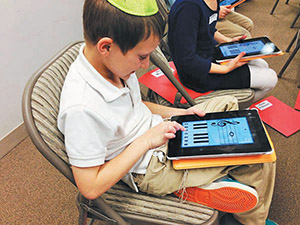


Morah Adina, as she is affectionately called, entered the Atid Day School Innovation Challenge hoping to spread the word about her creative approach to the music curriculum at Yeshivat Noam. The Challenge was open to all K-12 Jewish Day School teachers in the NYC Metropolitan area and offered a $1000 prize to eight winners who would be chosen by a combined vote from a panel of judges and public Internet-based voting. Entrants were judged based on creativity, impact, and ease of replication of their innovations in other classrooms. The idea was to inspire teachers to learn from each other and be moved to experiment with new approaches to enhance learning.
Morah Adina has been teaching music in yeshiva day schools for over 15 years. Her energy, enthusiasm, and love of music are palpable, and she is able to convey this passion to her students as well. No music class, Shabbat Oneg, Chaggigat HaSiddur, Kindergarten graduation, Tekes Kabbalat HaChumash, Chanukah Play, State fair (and the list goes on), would be complete without her special touch. But for Morah Adina, it was not enough to share her love of music or belief that it can help us to access deep spiritual reservoirs within. She wanted to provide her students with the opportunity to learn the skills necessary to read and play music independently.
As a seasoned music instructor, Adina understood the challenges of her aspirations, including the reality that teaching students to read music can often be boring and difficult to follow through with successfully on a large scale. Undaunted, Adina wove together an extraordinary curriculum using cutting edge technology to achieve her goals.
She explains, “Using iPads in class enables me to present lessons in a fun, interactive way, keeping the students’ interest. I began by introducing basic elements of music and the musical alphabet. Once I taught the mechanics of how to read music, I incorporated apps to strengthen their skills, which then enabled them to start playing piano on their own!”
Adina is able to have her students play and record music on their iPads, which she can listen to later without using valuable class time. “I had close to 100 students playing a piece of Beethoven’s 9th Symphony!” she shared triumphantly.
Morah Adina is proud of her unique curriculum and feels gratified by the positive feedback that continues to pour in from students and parents alike. She reports that many students have continued to advance their studies by exploring the apps further on their own time. Numerous children became motivated to pursue private instruction due to their exposure in Morah Adina’s class. Several students, who perhaps did not stand out in other classrooms, have had the opportunity to find a distinct talent or strength in their ability to read and play music.
While Yeshivat Noam may have won the Atid Challenge, truly, we are all the beneficiaries of this glimpse into educational innovation.
By Racquel Houpt









